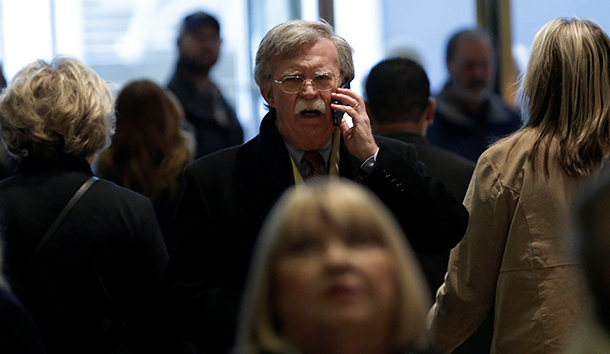Until March 22, when the White House announced that John Bolton would replace H.R. McMaster as national security advisor, it was still possible to imagine that President Donald Trump’s many compromises with the globalist-hegemonist establishment had been made under duress. This may have been true once, but it is not true now. Bolton’s appointment indicates that candidate Trump the noninterventionist has fallen victim to Stockholm Syndrome; he has ventured beyond surrender to adopt the mindset of his Deep State captors. It is the political equivalent of a neck-bitten vampire-slayer inviting Count Dracula to guard the blood bank.
John Bolton is not a mere neoconservative; he is a war hawk on steroids. As President George W. Bush’s undersecretary of state for arms control, he was a strident advocate of an attack on Iraq both before and after September 11. “We are confident that Saddam Hussein has hidden weapons of mass destruction and production facilities in Iraq,” Bolton said in 2002. At the same time, he knowingly misrepresented and distorted intelligence findings on WMD, disregarded or suppressed contrary information, and subjected his dissenting subordinates to abusive treatment. All of that has been attested by subsequent congressional reports, but over the years Bolton has learned nothing and forgotten nothing. “I still think the decision to overthrow Saddam was correct,” he said in 2015 of the Iraqi debacle. “I think the worst decision made after that was the 2011 decision to withdraw U.S. and coalition forces.”
Today, John Bolton advocates war against both North Korea and Iran. On February 28 he published an article in the Wall Street Journal under the self-explanatory title “The Legal Case for Striking North Korea First.” His “case” boiled down to the claim that the North Korean “threat is imminent, and the case against pre-emption rests on the misinterpretation of a standard that derives from pre-nuclear, pre-ballistic-missile times.” His conclusion was stunning: “It is perfectly legitimate for the United States to respond . . . by striking first.” In March 2015, Bolton advocated an Israeli attack on Iran, possibly with U.S. support. “Time is terribly short, but a strike can still succeed,” he wrote. “Such action should be combined with vigorous American support for Iran’s opposition, aimed at regime change in Tehran.” His overall assessment was simple: “To stop Iran’s bomb, bomb Iran.”
Predictably enough, Bolton advocates a confrontational course with Russia. The Kremlin’s so far unproved interference in the 2016 presidential election was, in Bolton’s view, a “true act of war, and one Washington will never tolerate.” Last July, after Putin told Trump that the accusations of meddling were untrue, Bolton asserted that he was “lying with the benefit of the best KGB training.” In February of this year he advocated a retaliatory cyber campaign against Russia that should be so “decidedly disproportionate,” and the costs to the Russians so high, “that they will simply consign all their cyberwarfare plans to their computer memories to gather electronic dust.” He also wanted Putin to “hear the rumble of artillery and NATO tank tracks conducting more joint field exercises with Ukraine’s military.” After the poisoning of former double agent Sergei Skripal in England, Bolton supported the unsubstantiated claim of Russian guilt by the British government and suggested a “very strong answer” from the Western world.
Bolton’s record on Iraq and his positions on other key issues of the day offer a depressing glimpse into his likely performance as Trump’s national security advisor. Far from coordinating, evaluating, and presenting policy ideas coming from different departments, which is his theoretical role, Bolton will try to get the President to accept his radically confrontational proposals. Any inconvenient strategic assessment passing through his hands will be doctored or ignored; all intelligence reports will be filtered in accordance with his inflexible outlook.
Bolton’s record in government, and his subsequent advocacy of multiple wars—from his FOX News pulpit, in his countless op-eds, and from the rostrums of the AEI, PNAC, JINSA, and other similar institutions—show beyond doubt that he is unable to analyze complex challenges and policy options rationally. His ideological blinkers and devious and neurotic personality, coupled with his manifest inability to relate the costs and risks of proposed policies to their benefits, should disqualify him from holding any position of responsibility anywhere in government. No public official is more likely to push America into a new war (or two) than Bolton.
The most important aspect of American grand strategy in our time, and for decades to come, should be the avoidance of nuclear war. John Bolton’s appointment makes the risk of ultimate calamity more likely than before.

Leave a Reply